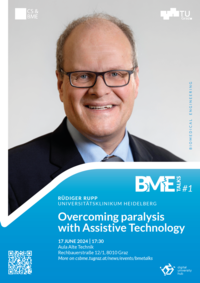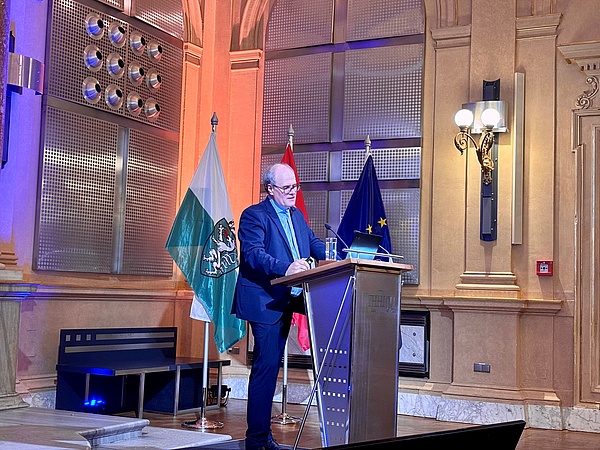

BME-Talk #1
Overcoming paralysis with Assistive Technology
Rüdiger Rupp (Universitätsklinikum Heidelberg)
June 17th, 2024, 5:30 pm
Aula, Alte Technik
Rechbauerstraße 12, 8010 Graz
No registration necessary!
Abstract
A spinal cord injury (SCI) leads to paralysis of lower and in people with cervical SCI also upper extremities. Although a causal therapy is not available, with assistive technology (AT) a substantial improvement of motor functions can be achieved. In incomplete SCI, robotic exoskeletons are nowadays routinely used for training. Spinal cord stimulation holds promise to boost the outcomes beyond the current limits. A complete loss of hand function can be compensated by neuroprostheses based on functional electrical stimulation. Due to current legal constraints, early testing of innovative AT in end-users has become highly challenging.
Bio
Prof. Dr.-Ing. Rüdiger Rupp received the Dipl.-Ing. degree in electrical engineering with focus on biomedical engineering and his Dr.-Ing. degree from the Technical University of Karlsruhe, Germany, in 1994 and 2008, respectively. He received his venia legendi in 2018 in Experimental Neurology from Heidelberg University and since 2021 he has a professorship for Assistive Neurotechnology at Heidelberg University.
After working at the Institute for Biomedical Engineering and Biocybernetics (Prof. G. Vossius) until 1996, since 1997 he is with the Spinal Cord Injury Center (Head: Prof. N. Weidner) of Heidelberg University Hospital, Heidelberg, Germany, where he holds the position as the head of the section Experimental Neurorehabilitation.
His main research interests are in the field of rehabilitation engineering for people living with spinal cord injury. This includes neuroprosthetics mainly of the upper extremity, man-machine interfaces, gait analysis, development and clinical validation of novel methods and devices for locomotion therapy and realization of software projects for standardized documentation of rehabilitation outcome.
He is author of more than 320 journal, book chapter, textbook and conference publications and holds two patents. He has been awarded several times for his work and is a member of IEEE, IFESS, VDE, DMGP, DGOOC, NervClub, ISCoS and ASIA. Since 2017, he is chair of the ASIA International Standards Committee. He is member of the Board of Directors of ASIA and DSQ and president-elect of the DMGP.
Speaker's Lunch
With the Speaker's Lunch/Dinner, our faculty offers a unique opportunity for students from the Dean's List ranking to meet renowned scientists. The relaxed atmosphere encourages open conversations and allows students to ask questions, exchange views on current research topics and build a strong professional network. By engaging directly with leading academics, students can gain valuable advice and perspectives to help them achieve their career goals and pursue their academic interests. The Speaker's Dinner/Lunch is thus an enriching addition to the regular study routine and helps to support students on their way to becoming successful and well-connected professionals in the field of Computer Science and Biomedical Engineering.
Four students had the opportunity to take part in the Speaker's Lunch with Rüdiger Rupp.
"The personal meeting with Prof. Rüdiger Rupp gave us interesting insights into the exciting world of research. He told us first-hand about the challenges facing us, biomedical engineers, as we are the intersection between medicine and technology. His successful career path serves as an inspiration to us that we too could one day help patients with our developments."
-Mihaela Koleva, Speaker's Lunch participant
Lisa Windisch
CSBME - Marketing, PR, Fakultätskommunikation
Graz University of Technology
Email: marketing.csbme@tugraz.at
Phone: ++ 43 873 4055
Dear participants!
Photos will be taken in order to promote and document this event!
The photos might be published on brochures or websites of Graz University of Technology as well as on social media.
If you do not wish to be photographed, please tell one of the organizers or photographers!

